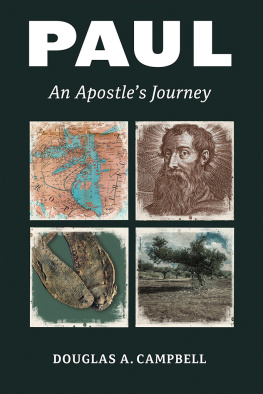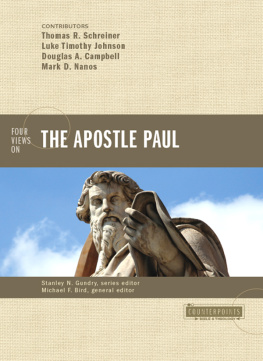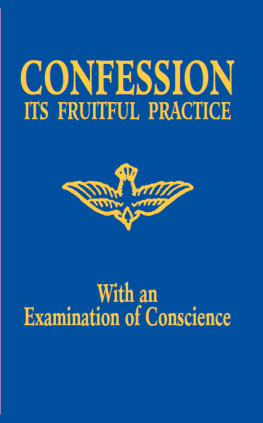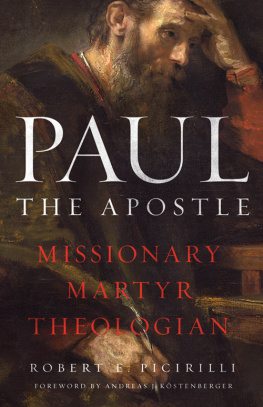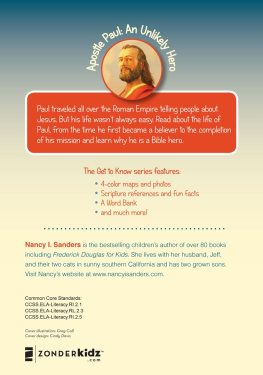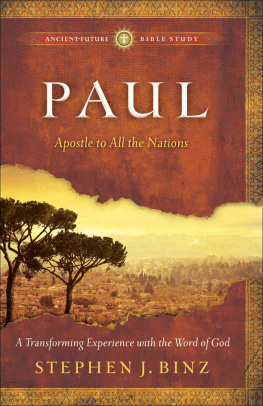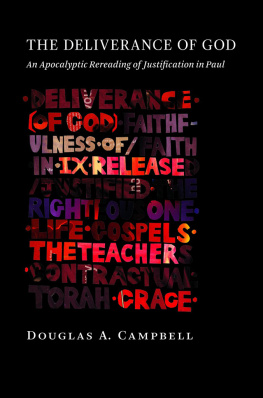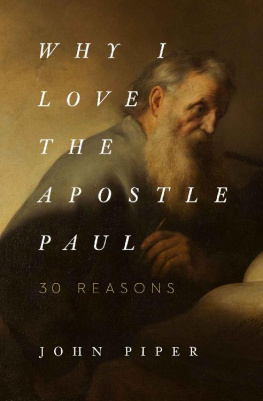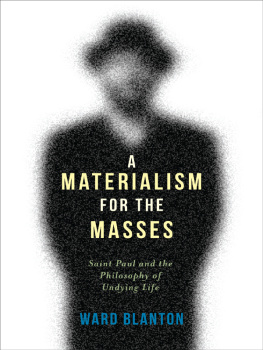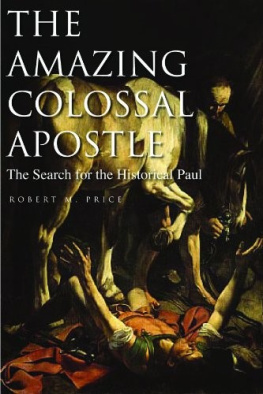Campbell Douglas A. - Paul an apostle’s journey
Here you can read online Campbell Douglas A. - Paul an apostle’s journey full text of the book (entire story) in english for free. Download pdf and epub, get meaning, cover and reviews about this ebook. year: 2018, publisher: William B. Eerdmans Publishing Company, genre: Religion. Description of the work, (preface) as well as reviews are available. Best literature library LitArk.com created for fans of good reading and offers a wide selection of genres:
Romance novel
Science fiction
Adventure
Detective
Science
History
Home and family
Prose
Art
Politics
Computer
Non-fiction
Religion
Business
Children
Humor
Choose a favorite category and find really read worthwhile books. Enjoy immersion in the world of imagination, feel the emotions of the characters or learn something new for yourself, make an fascinating discovery.
- Book:Paul an apostle’s journey
- Author:
- Publisher:William B. Eerdmans Publishing Company
- Genre:
- Year:2018
- Rating:3 / 5
- Favourites:Add to favourites
- Your mark:
- 60
- 1
- 2
- 3
- 4
- 5
Paul an apostle’s journey: summary, description and annotation
We offer to read an annotation, description, summary or preface (depends on what the author of the book "Paul an apostle’s journey" wrote himself). If you haven't found the necessary information about the book — write in the comments, we will try to find it.
Paul an apostle’s journey — read online for free the complete book (whole text) full work
Below is the text of the book, divided by pages. System saving the place of the last page read, allows you to conveniently read the book "Paul an apostle’s journey" online for free, without having to search again every time where you left off. Put a bookmark, and you can go to the page where you finished reading at any time.
Font size:
Interval:
Bookmark:

PAUL
An Apostles Journey
Douglas A. Campbell
WILLIAM B. EERDMANS PUBLISHING COMPANY
GRAND RAPIDS, MICHIGAN
Wm. B. Eerdmans Publishing Co.
2140 Oak Industrial Drive NE, Grand Rapids, Michigan 49505
www.eerdmans.com
2018 Douglas A. Campbell
All rights reserved
Published 2018
27 26 25 24 23 22 21 20 19 181 2 3 4 5 6 7 8 9 10
ISBN 978-0-8028-7347-7
eISBN 978-1-4674-4942-7
Library of Congress Cataloging-in-Publication Data
Names: Campbell, Douglas A. (Douglas Atchison), 1961- author.
Title: Paul : an Apostles journey / Douglas A. Campbell.
Description: Grand Rapids : Eerdmans Publishing Co., 2018. | Includes bibliographical references and index.
Identifiers: LCCN 2017029709 | ISBN 9780802873477 (pbk. : alk. paper)
Subjects: LCSH: Paul, the Apostle, Saint.
Classification: LCC BS2506.3 .C365 2018 | DDC 225.9/2 [B] dc23
LC record available at https://lccn.loc.gov/2017029709
To Dorothy Leigh Campbell, nee Atchison (1937)
and Graeme Douglas Campbell (1931)
From whom I have received so much
Contents
This book is designed to introduce the apostle Paul to a group of students or adult learners who havent had much exposure to the dense scholarly conversation about him. The material it provides should supplement a series of lectures and studies of key passages in his letters nicely. If this proves to be the case, however, may I suggest interleaving some field trips into the standard classroom or Sunday school experience? In my teaching I emphasize two especially. The students in my Life and Thought of Paul class are strongly encouraged to go on a prison visit. We also travel to the site of a large local former slave plantation, Stagville. There we read out the Household Codes (see chapter six) in the luxurious owners house and then again in the slave quarters. The impact of these embodied pedagogical exercises is hard to overstate. They have proved so valuable I would recommend as many as you can organizeperhaps to a morgue, a hospital, a synagogue, and/or a workshop where people are laboring hard with their hands. These are other key locations for Pauls instruction and for the circumstances that elicited his letters. An evening meal together is a good idea as well, preferably with a letter read out at the end of it by candlelight. I suspect that this sort of course will prove unforgettable to its participants, and (perhaps more importantly) it will shape them in tangibly Pauline ways.
Michael Thomson lured me into a restaurant during the Society of Biblical Literature conference in San Diego and I emerged having agreed to do something, although the exact details at the time were a little blurry. It turned out to be this book and I thank him for prevailing upon me. I have needed to provide people with an accessible overview of Paul, and he was quite right to see this and to press me to just do it.
All of the staff at Eerdmans have, as usual, been friendly, supportive, and professional, for which I am grateful, as has the indefatigable and indefatigably cheerful Judith Heyhoe, our in-house editor at Duke. And I am also deeply grateful to the professional, efficient, and delightfully happy staff at the National Humanities Center, where I spent a wonderful year on sabbatical.
I want to thank my focus group. They helped me to find the right way to talk with people who have not been shaped by a seminary experience. There is an uncanny resemblance here to members of my family: Rupert, Georgia, Graeme, and Leigh.
Finally, I am grateful in ways that words can barely express to my best friend, my life partner, and my soulmate, Rachel. Nothing happens without her, and so much happens because of her. She is truly lovely in form and beautiful, not to mention talented, supportive, insightful, faithful, andmost important of alla great deal of fun.

Pauls influence
The apostle Paul is the most influential political philosopher in the USA today, and arguably in the rest of the world as well, and this surely makes him one of the most important figures in human history. He is not a contemporary philosopher, but he still exerts an unprecedented influence on current American culture and politicsfar more than any modern figure, whether we are talking about someone like John Locke, who greatly influenced the Constitution, or a figure like David Brooks, who writes in the New York Times and is read by 1.3 million people every day. This is quite an achievement when we consider that Paul lived two thousand years ago and left a literary legacy of just a dozen letters or so (and one of them is very short). It is nevertheless this tiny literary legacy that drives his influence.
Thirteen letters gathered together in the New Testament bear Pauls name and comprise about 25 percent of that scriptural collection. But he exerts an influence out of all proportion to this percentage. Of all the writers in the New Testament, Paul addresses churches directly and provides clear instructions about the significance of what Jesus did. Consequently he tends to be the go-to person for most modern Christian preachers, and especially for those who are Protestants of some sort who make up about one quarter of the current worldwide Christian population. The rest of the New Testament, and even of the Bible as a whole, is then frequently read in his terms, through Pauls spectacles we might say. And the Bible has had an enormous impact on modern American culture, and on Christian and post-Christian countries elsewhere, and still doesa Pauline Bible.
A third of the worlds populationalmost 2.2 billion peopleis in some sense Christian; there are fewer and fewer Christians in European and post-European countries but more and more everywhere else. When these adherents go to church they will most likely hear a short passage written by Paul that they will have expounded to them as Scripture. Many of these listeners will try to understand this ancient paragraph, to reflect upon it, and to apply it, believing that God is speaking through it. It may be the basis for their prayers, meditations, exhortations, corrections, teaching, thanksgiving, and praise. The most zealous of these church attenders will read and ponder texts written by Paul every day. Few writers in the entire human race, if any, have had this influence. It should be no surprise to learn then that the interpretation of Paul is deeply and even bitterly contested.
He wrote a long time ago, not very much that he wrote has been preserved, and what he says is enormously important. These three factors create a situation ripe for interpretative conflict. We want Paul to say certain things, irrespective of whether he actually said them, because the stakes for him doing this are so high. If Paul says it, in some sense God says it. Did he support capital punishment? Was he anti-gay? Did he care about abortion? Did he believe in low tax rates? Many of these questions seldom if ever crossed the busy missionarys mind, but we need him to say something about them, and different people want him to say different things.
The interpretation of Paul is consequently one of the most important tasks for the Christian in the world today as well as being one of the most debated and confused. I myself would go so far as to suggest that the real Paul has been largely buried under later arguments and conflicts about how to read him. His presentation todayand certainly in the USfrequently derives more from the culture and politics of the person reading him than from Paul himself, which is why I am writing this book.
Font size:
Interval:
Bookmark:
Similar books «Paul an apostle’s journey»
Look at similar books to Paul an apostle’s journey. We have selected literature similar in name and meaning in the hope of providing readers with more options to find new, interesting, not yet read works.
Discussion, reviews of the book Paul an apostle’s journey and just readers' own opinions. Leave your comments, write what you think about the work, its meaning or the main characters. Specify what exactly you liked and what you didn't like, and why you think so.

